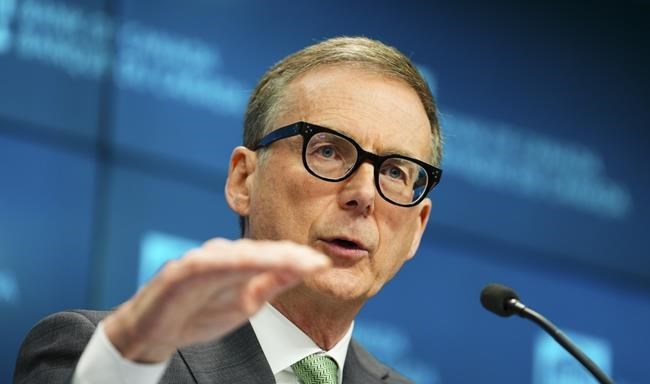OTTAWA — Bank of Canada governor Tiff Macklem says the financial system has to adjust to higher interest rates, just like the rest of the economy.
Macklem addressed the recent banking stress that was set off in the U.S. last month while speaking to reporters Friday from the sidelines of the International Monetary Fund meetings in Washington, D.C.
The collapse of Silicon Valley Bank, followed by other financial institutions, has raised concerns about the implications of rapid interest rate hiking on financial stability.
But Macklem said central banks won't be backing down, noting they're "resolved in getting inflation back to their inflation targets."
"Households, businesses, governments have to adjust to higher interest rates, and so does the financial system," he said.
The governor said adjusting to higher interest rates can be hard for the financial system, just as it can be difficult for everyone else.
Central banks have raised interest rates aggressively over the last year as they act in unison to crush high inflation that was set off after the COVID-19 pandemic. The rapid rise in interest rates, however, has proven to be challenging for some financial institutions.
In the case of Silicon Valley Bank, the medium-sized California-based lender ran into trouble after losing a bet that interest rates would stay low. Instead, interest rates rose — as the U.S. Federal Reserve repeatedly raised its benchmark rate to fight inflation — and the bank’s bond portfolio plunged in value. As its troubles became public, worried depositors started to withdraw their money in an old-fashioned bank run.
The demise of Silicon Valley Bank was followed by the collapse of New York-based Signature Bank two days later.
Later in March, Swiss authorities pushed UBS to take over its rival after the price of Credit Suisse shares plunged and depositors fled, raising fears that it could fail.
In the Bank of Canada's quarterly monetary policy report released Wednesday, the central bank weighed in on the recent banking stress, noting it will contribute to slower global growth as credit conditions tighten.
"Recently, funding costs for U.S. banks have increased, and concerns exist that conditions could deteriorate further. Consequently, some pullback in lending is expected, particularly at U.S. regional banks, which play an important role in lending to small businesses," the report said.
Despite this, Macklem said he disagrees with the idea that price stability and financial stability are at odds with each other and added that achieving both is critical.
"They reinforce each other," he said.
"Financial stability is a precondition for price stability, and price stability, confidence in the value of money, that's foundational to a stable and well functioning financial system."
The governor also noted that the central bank has other tools available to provide emergency liquidity to the financial system in the case of a crisis.
This report by The Canadian Press was first published April 14, 2023.
- With files from The Associated Press.
Nojoud Al Mallees, The Canadian Press



